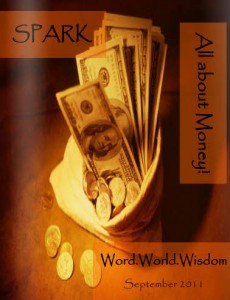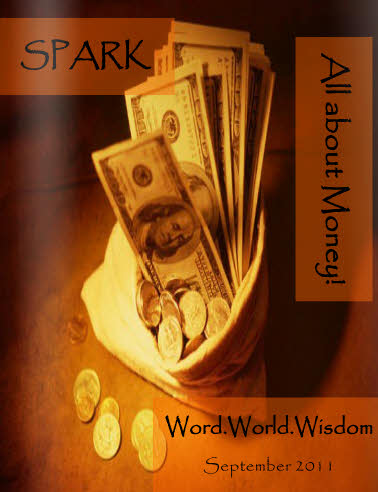 MONTH: September 2011
MONTH: September 2011
THEME: ALL ABOUT MONEY
CONCEPT: Money is a theme which has many interesting dimensions. The September issue looked at many of these.
FEATURED PERSONALITIES OF SEPTEMBER 2011:
Deepa Venkatraghvan, Chartered Accountant and Author
Priya Gopal, Educator.
We were not sure what sort of a response a theme such as ‘All about Money!’ would generate. Interestingly, we got some very nice dimensions to the topic. Contributors came up with work offering perspectives such as philosophy, poverty, middle-class living, money musings and even customer service! The financial angle also found its place through our featured columns. [/box]
It’s been two years since the world saw those three interesting words strung together ‘Word. World. Wisdom.’ As a writer for Spark, writing mostly on finance, I have enjoyed this journey. So when I was told about the second anniversary issue, I thought the best thing to do would be to chronicle our ‘money journey.’ How has our money fared in the last two years? Have we made money or lost it? Did we get wealthier? Let’s take a look.
Thumbs up to the noble metal
Gold has been the clear winner. From a price of Rs 16,800 per 10 gm in December 2009, the price of gold has rocketed to Rs 27,200 in December 2011 – a growth of 61% over these two years. Gold ETFs too reflected this trend. The average return from the gold ETF category was 26.8% per annum over the last two years.
But surprise surprise! It’s not gold prices alone that went up. Let me explain.
Internationally, the price of gold went up from $ 1096 per ounce in December 2009 to $ 1591 per ounce in December 2011 – a growth of 45% in the last two years. However, the Indian rupee fell from Rs 46 per dollar to Rs 53 per dollar during that period. So Indian investors gained an additional 16% just from the depreciation of the rupee against the dollar.
Tip: While the recent price increase in gold may make it seem a great investment option for high returns, gold is at best a safe haven and is not known to give great returns consistently over long periods of time. The recent price rise has been a result of investors buying gold as a safe option to guard themselves against economic uncertainties in Europe. When the clouds lift, investors are likely to sell gold and invest back in paper.
Keep not more than 10-15% of your investments in gold.
Bank deposits and bond funds: Fighting a hidden enemy?
Bank deposits have become more attractive over the past two years. If you had invested in two- year term deposit in December 2009, you would have made a return of 6.5-7% per annum. If you were to make the same deposit today, your returns would be upward of 9%.
But the bad news is that there is a hidden enemy – Inflation. Inflation has also been at high levels during this time. In December 2010, inflation was at 8.43% and by November 2011 it had gone up to 9.1%. This would make the real returns from bank deposits run into the negative.
In the case of debt mutual funds, as interest rates rise (Repo rate has gone up from 5% to 8.5% in this time frame and the reverse repo rate has been up from 3.5% to 7.5%) to counter soaring inflation, yields tend to fall. Over the last two years, the average return of the short term debt mutual fund category was 6.93% while liquid and income funds generated close to 7%.
Tip: While bank deposits appear to give attractive interest rates, they seldom beat inflation in the long term. So invest in bank deposits and debt instruments only for financial goals that are 3-4 years away. For long term investments, look at equities.
If you do have a term deposit with a lower rate of return, close it and invest your money in a new deposit that gives a higher interest rate. Just watch out for the tax implications and any premature withdrawal charges.
Thumbs down, Equities, but don’t lose your sleep
The stock market has been a big loser. From 17360 in December 2009, the BSE Sensex today is at 15800 levels. The reason: global economic uncertainties are making investors pull out of developing markets like India and take refuge in gold and the dollar.
Among equity mutual funds, returns from large, small and mid-cap funds fell around 4% per annum over the last two years. The only fund categories that ended positive in the last two years were Pharma funds and FMCG funds. Pharma funds gave close to 10% returns per annum while FMCG funds returned 23% per annum.
Tip: Don’t be disappointed with the two year statistics. Equities beat inflation and give the best returns over a long period of time – at least 5-7 years. Equity stock prices can beat inflation because their underlying companies generate profits which are inflation adjusted. Profits are inflation adjusted because if inflation goes up and costs increase, companies will increase their prices too in order to generate profits. Of course, it goes without saying that this is true for good companies headed by able managements who have the competence to deploy sound strategies to maintain margins, either by managing costs or sales.
The above reasoning holds true in the long term, of at least 5-7 years and over. In the short term, the prices of equity shares are driven by traders and speculators who are looking at short term gains. They bet on scrips on the basis of tips and information which may or may not happen. However, over a long period of time, the short term volatilities get evened out and the returns reflect growth that is more realistic. The trick is to stay put for the long-term.
Pay more for home loans
As interest rates rose, bank deposits gave better returns. But on the other hand, banks also charged more on their loans. Home loan interest rates that were around 8.5% in December 2009 have gone up to nearly 11% in December 2011.
Tip: The simple thing to do in case you are looking to pre-close your loans is to check if you are paying more by way of interest as compared to what you could have earned on that money. If you can earn more than 11% on your money through other investments, then it does not make sense to repay the loan before the entire term. If you are making less than 11%, you might want to consider prepaying part of the loan.
Deepa Venkatraghvan is a Chartered Accountant. She is also the author of the CNBCTV18 Bestsellers ‘Everything you ever wanted to know about investing’ (which was later updated and released as, ‘Everything you wanted to know about investing in difficult times’) and ‘What your financial agent will tell you and why you shouldn’t listen’. Her latest book, ‘Step by step guide to start Investing’ was published in March 2011.
[box type=”download”] If you have trouble opening the PDF, please right click on the button and select ‘Save Link As/Save Target As’. This will help save the PDF to your computer. If you still have trouble, drop us a mail at editors@sparkthemagazine.com and we will mail you the PDF straight to your inbox! DON’T MISS THE PDF EXPERIENCE![/box] [button link=”https://sparkthemagazine.com/wp-content/uploads/2012/01/spark-january-2012.pdf” color=”red” newwindow=”yes”] Read it all at one go! Download the PDF here![/button] [button link=”http://issuu.com/sparkeditor/docs/spark-january-2012?mode=embed&layout=http%3A%2F%2Fskin.issuu.com%2Fv%2Fcolor%2Flayout.xml&backgroundColor=000000&showFlipBtn=true” color=”green” newwindow=”yes”] Flip and read like a mag on the e-reader! Click here![/button]
[facebook]Share[/facebook] [retweet]Tweet[/retweet]








